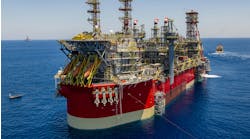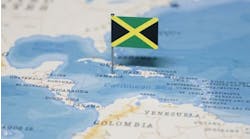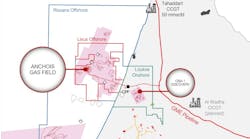Reviewing proposed EU oil and gas offshore safety regulation: Little to fear and much to gain, or a slippery slope?
It might be said that the industry has little to fear and much to gain from efforts in Brussels to ensure the safety of offshore oil and gas production in Europe. However, many will view recent moves as unnecessary, unwelcome, and the beginning of a slippery slope to centralized regulation of offshore oil and gas production. The new proposals, outlined in the autumn by the European Commission, are set to harmonize standards and best practices by bringing the rest of the region up to the levels of safety enjoyed in the UK and Norway.
While most European offshore oil and gas production is still in the UK and Norway, it has been spreading across the region; and exploration and production licences have now been awarded in 13 member states, including many Mediterranean countries. Brussels is concerned that national legislation is very different across the EU. The new proposals are about to level the playing field.
While the proposals appear to heavily reflect the successful UK regime, the industry still needs to review the draft in detail for any departures from that regime that might have unintended consequences on its effectiveness.
For example, it is already apparent that the regulation will require the competent authority of each member state to establish an anonymous whistle-blowing procedure to allow workers to report environmental or health and safety concerns, while remaining anonymous. While the intention is good, it may raise the spectre of malicious reporting in the industry.
Contrary to earlier pronouncements, the regulation will not apply to operations of EU-headquartered companies beyond the EU, though operators will have to "endeavor" to conduct their worldwide offshore oil and gas operations in accordance with its principles. Some parties will view this as a missed opportunity to raise standards across the globe, though the European industry will be pleased that its ability to compete with national oil companies not subject to the same standards is not inhibited.
The draft sets clear rules that cover the whole lifecycle of all exploration and production activities, from design to the final removal of an oil or gas installation. Under the control of national regulatory authorities, European industry will have to assess safety standards for offshore operations on a regular basis, taking into account new technology, new know-how, and new risks.
Energy Commissioner Günther Oettinger said: "Securing best industry practices in all our offshore operations is an indisputable must. [This] proposal is a crucial step forward towards safer offshore activities to the benefit of our citizens and our environment."
To advance this goal, there are several major features of the regulation. They include licensing, independent verification, obligatory ex ante emergency planning, emergency response, and liability.
Under licensing, the authorities in each member state will have to ensure that only those operators with sufficient technical and financial resources necessary to control the safety of offshore activities and environmental protection are allowed to explore for and produce oil and gas in EU waters.
In addition, the technical solutions presented by the operator that are critical for safety on the installation will need to be verified by an independent third party prior to, and periodically after, the installation starts operating.
Companies will also have to prepare major hazard reports for their installations, containing a risk assessment and an emergency response plan before exploration or production begins. These reports will need to be submitted to national authorities, which will give the go-ahead if satisfied.
Transparency is increasingly important and comparable information must be made publicly available about the standards of performance of the industry and the activities of the national authorities.
Companies will also need to prepare emergency response plans based on their rig or platform risk assessments, and to keep resources at hand to be implemented when necessary. Member states will likewise take full account of these plans.
Finally, existing rules on environmental damage will be extended from territorial waters to the whole continental shelf and exclusive economic zone so that oil and gas companies will be fully liable for environmental damage to protected marine species or natural habitat.
Most of this marks little change for UK North Sea operators, who already work under world-class safety standards. The worry is that centralized European regulation might inhibit the UK regulators' ability to adapt and innovate in response to new technical challenges and industry movements in the North Sea. One size will not fit all, and the industry will view with grave misgiving the prospect of the European courts being judge and jury over the UK regulatory regime.
If current lobbying by the UK industry fails to derail the proposal, the regulation will become law once adopted by the European Council and Parliament. It will then be expected to come into force for existing installations in 2014, with a prior transitional period of one year for planned productions. For many operators, it will be business as usual, but those not already operating in the UK and Norway would do well to start preparing now.
Jan Burgess
CMS Cameron McKenna
This page reflects viewpoints on the political, economic, cultural, technological, and environmental issues that shape the future of the petroleum industry. Offshore Magazine invites you to share your thoughts. Email your Beyond the Horizon manuscript to David Paganie at[email protected].
Offshore Articles Archives
View Oil and Gas Articles on PennEnergy.com


